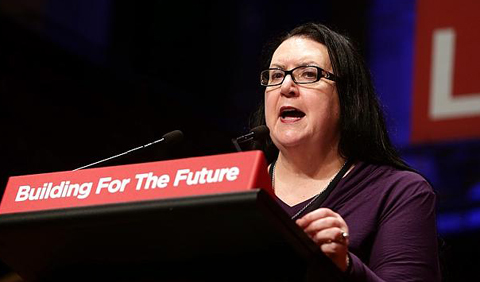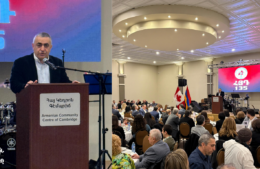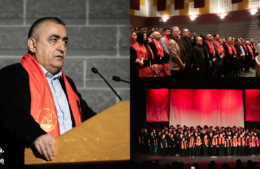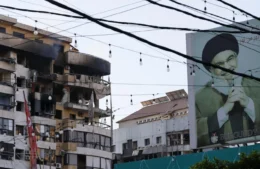Australian politician: Azerbaijan deserves condemnation, not Formula 1
- (0)
Australian politician: Azerbaijan deserves condemnation, not Formula 1 –

SYDNEY: Member of the New South Wales Legislative Council, Amanda Fazio has called out Azerbaijan’s aggression toward the Republic of Nagorno-Karabakh and the Republic of Armenia, stating that it doesn’t deserve the hosting rights to a Formula 1 Grand Prix in 2016.
Fazio, who visited Armenia and Nagorno-Karabakh in July 2013, delivered a statement on the floor of the NSW Legislative Council highlighting the ongoing aggression by Azerbaijan and the war-mongering by President Ilham Aliyev, the serious human rights abuses within that country and the need for the international community to take a far stronger position on condemning Azerbaijan’s aggression.
“The recent decision to allow Azerbaijan to host a Formula 1 Grand Prix in 2016 should be rescinded,” Fazio exclaimed. “The awarding of this race to a country which acts as an aggressor in the region and has an appalling record on human rights defies logic.”
She added: “The list of human rights violations regularly perpetrated by the Azerbaijani authorities is long and includes clamping down on the right to freedom of expression, assembly and association including persecution of activists, arresting them on trumped up charges and denying them the right to a fair trial.”
“It is time the international community took a stand against the unnecessary aggression and repression of human rights being exerted by the government of Azerbaijan,” Fazio concluded.
Over the past two weeks Azerbaijan has intensified its aggression towards Armenia and Nagorno-Karabakh, which has resulted in a large number of casualties. President Aliyev has gone as far as declaring war via a series messages sent via the social media website, Twitter.
Executive Director of the Armenian National Committee of Australia (ANC Australia), Vache Kahramanian, welcomed Fazio’s statement. He remarked: “Once again Ms Fazio has taken the moral high ground in defending the people of Armenia and Nagorno-Karabakh.”
The Parliament of Australia’s largest state of New South Wales recognised the Republic of Nagorno-Karabakh and its right to self-determination in a unanimous motion in October 2012.
The full text of Amanda Fazio’s speech can be read below:
In July last year I had the opportunity to visit Armenia and Nagorno-Karabakh and to address the Parliament in Stepanakert. Since then I have continued to have an interest in developments in this region of the Caucasus.
The background to the situation is that on 20 February 1988 the Soviet of People’s Deputies in Karabakh voted 110 to 17 to request the transfer of the region to Armenia. This unprecedented action by a regional soviet brought out tens of thousands of demonstrators both in Stepanakert and Yerevan, but Moscow rejected the Armenians’ demands.
At that time the population of 192,000 was 76% Armenian and 23% Azerbaijanis with the remainder being Russian and Kurdish minorities.
On December 10, 1991 in a referendum Armenians in Nagorno-Karabakh approved the creation of an independent state. A Soviet proposal for enhanced autonomy for Nagorno-Karabakh within Azerbaijan satisfied neither side, and a full-scale war subsequently erupted between Azerbaijan and Nagorno-Karabakh, the latter receiving support from Armenia.
The struggle over Nagorno-Karabakh escalated after both Armenia and Azerbaijan attained independence from the Soviet Union in 1991.
By the end of 1993, the conflict had caused thousands of casualties and created hundreds of thousands of refugees on both sides. In May 1994, for the first time during the conflict, the Azerbaijani government recognized Nagorno-Karabakh as a third party in the war, and started direct negotiations with the Karabakh authorities. As a result, a cease-fire was reached on 12 May 1994 through Russian negotiation.
Since the beginning of 2014, Azerbaijan has violated the ceasefire regime over 18,000 times in comparison to 13,000 cases for the entire year of 2013. During the same time period Azerbaijan has also initiated 26 reconnaissance-sabotage operations or attempted operations 65% of which (or 15 cases) were registered since July 25, 2014.
The Azeri aggression has not been this intense since the 1994 ceasefire was signed. Since the start of the year there have been over 50 Armenian causalities and Azerbaijan continues to reject repeated calls to remove snipers from along the line of contact.
This tense situation still persists. The Azerbaijani side is initiating military operations unprecedented in their scale and nature, including intense violations of the ceasefire regime, shootings at civilian settlements from large-calibre weapons as well as the shift of forces in the line of contact and the rear guard and increases in the number of cyber and intelligence operations. The analysis shows that the intensity of ceasefire regime violations has not decreased since the beginning of August.
In addition to firing in the direction of Armenian military positions, the country’s peaceful settlements in northern border region are also under constant fire. Azerbaijan is using large calibre and artillery weapons, such as hand-held anti-tank grenade launchers, 23 millimetre anti-aircraft installations, 82 millimetre mortar shell launchers and thermobaric weapons.
These unsuccessful activities can be rightly characterized as offensive military operations. They are not subversive in nature because in many cases they were carried out during broad daylight utilising large groups of combatants with the clear goal of trying to occupy the Armenian positions.
In the same time period, Azerbaijan also conducted other activities. Their entire military personnel were called for mobilization and brought to a heightened level of preparedness.
There were recorded shifts of personnel and equipment, an increase in flight activity of air force planes and helicopters along the line of contact. Certain units have been brought to a high degree of combat readiness, command centres have been deployed, and unmanned aerial vehicle flights in the border areas have increased. Such activity by Azerbaijan is unprecedented since 1994.
The international community, including the UN, the US State Department, OSCE and the Russian Ministry of Foreign Affairs continue to call on “both parties to exercise restraint”, without calling out Azerbaijan’s aggression.
The recent decision to allow Azerbaijan to host a Formula 1 Grand Prix in 2016 should be rescinded. The awarding of this race to a country which acts as an aggressor in the region and has an appalling record on human rights defies logic.
The persecution of human rights activists continues unabated in Azerbaijan, in spite of the obligations the country committed to as a member of Council of Europe and currently a chair of its decision making body, the Committee of Ministers.
The list of human rights violations regularly perpetrated by the Azerbaijani authorities is long and includes clamping down on the right to freedom of expression, assembly and association including persecution of activists, arresting them on trumped up charges and denying them the right to a fair trial. Amnesty International currently counts at least 19 prisoners of conscience behind bars solely for peacefully expressing their views.
It is time the international community took a stand against the unnecessary aggression and repression of human rights being exerted by the government of Azerbaijan.



















